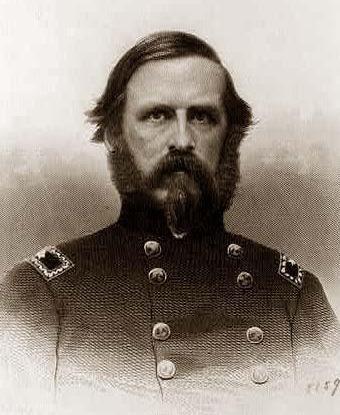Last updated: June 17, 2015
Person
Edward Wild

Library of Congress
A homeopathic doctor and Union officer in the Civil War, Edward A. Wild graduated from Harvard with a medical degree in 1846. He joined his father's homeopathic practice after studying medicine in Paris, France. In 1855, Wild received his first taste of military action in the Crimean War while serving as a medical officer in the Ottoman Army. Following the war, Wild returned to his native Massachusetts and resumed his medical practice.
At the outbreak of the Civil War, Wild, favoring the command of troops over the practice of medicine, recruited a company of men to serve in the 1st Massachusetts Infantry. As a captain, he led his company into battle at First Bull Run and later in the Peninsula Campaign, during which he was wounded in the hand. He was promoted to colonel of the 35th Massachusetts Infantry in the Army of the Potomac. In September 1862, Wild was wounded at the Battle of South Mountain which required the amputation of his left arm.
In April 1863, Wild recovered sufficiently from his wound to accept an assignment as a recruiting officer with the rank of brigadier general. Strongly against slavery, he labored hard to recruit black soldiers into the United States Colored Troops, as well as officers to lead them. Wild assumed command of a unit of black volunteers and freed slaves, known as "Wild's African Brigade," which served in numerous skirmishes and battles around Charleston, South Carolina, such as Camden Court House in December 1863. In an expedition along the North Carolina coast during the winter of 1863--1864, Wild's troops terrorized the local white population. Freeing and recruiting slaves along the way, Wild's frightening reputation among Southerners grew after he allowed former slaves to whip their former owner. He generated even more controversy by taking three women as hostages and sanctioning the wanton destruction and looting of property.
In 1864, Wild's command was transferred to the Army of the Potomac, participating in the Overland Campaign and the Siege of Petersburg. At the Battle of Wilson's Wharf in May 1864, his brigade became famous in the North for fending off a determined attack by Confederate General Fitzhugh Lee's cavalry, despite Lee's vast superiority in numbers. In April 1865, Wild's brigade, as part of a larger force of African American troops under Godfrey Weitzel, occupied the former Confederate capital of Richmond.
Following the war, Wild's wounds precluded a return to his medical practice. He worked in Georgia for the Freedmen's Bureau, but became mired in controversy and was relieved from duty by General Grant. Wild then moved west and operated silver mines in Nevada and Ontario, Canada. He died while surveying a rail line in Columbia, South America.
